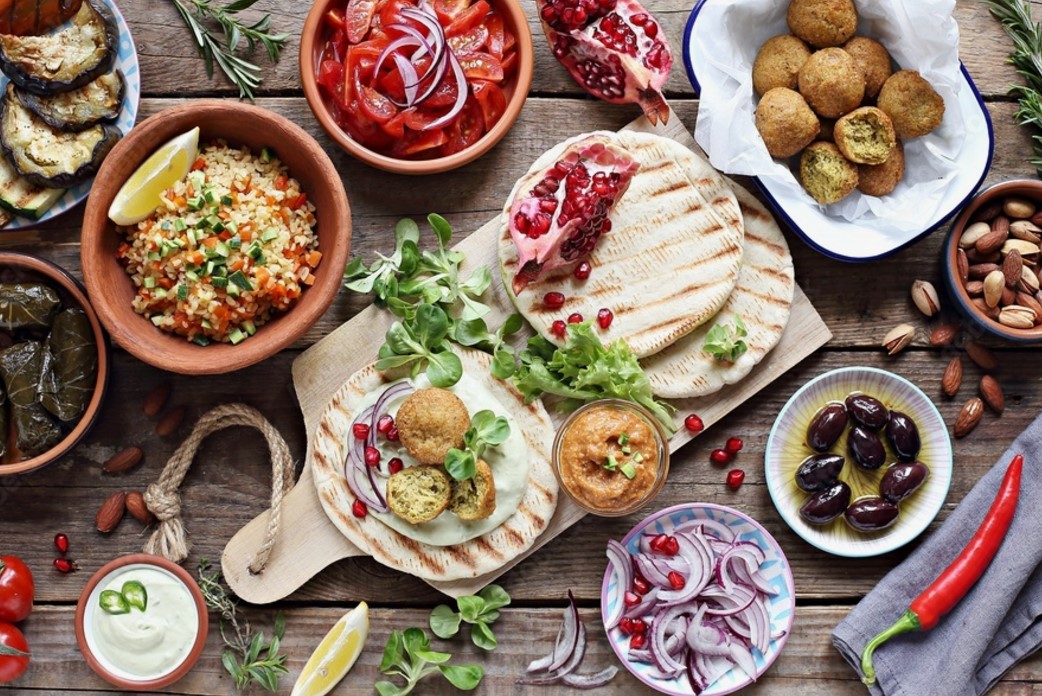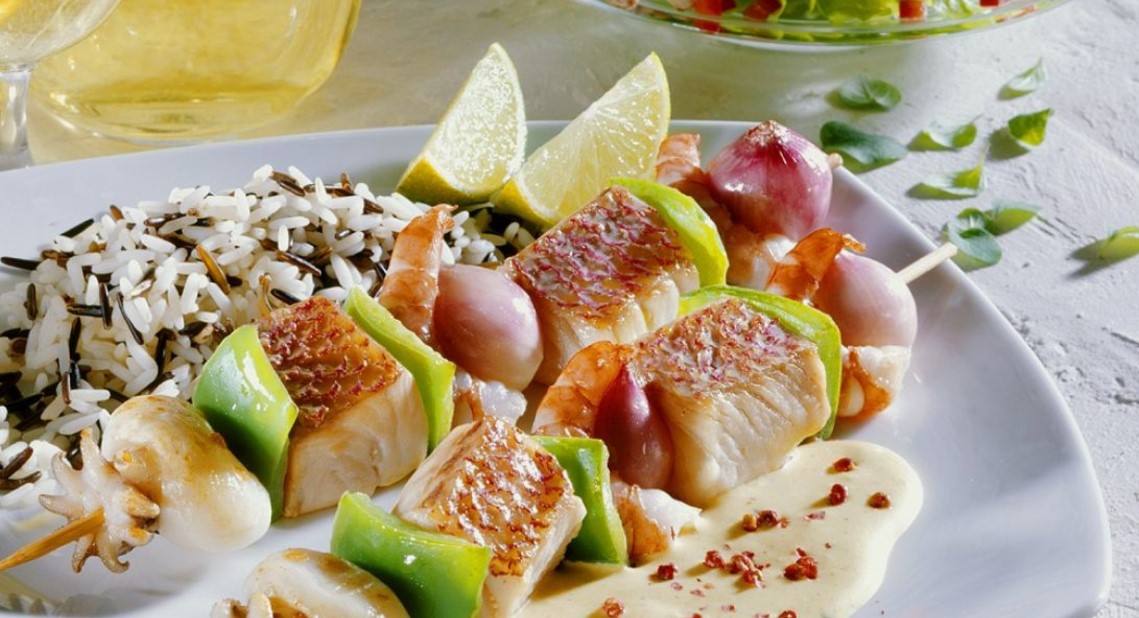Mediterranean Cuisine: A Vibrant World of Gastronomy
Mediterranean cuisine is a rich tapestry of flavors and traditions that has evolved over centuries along the shores of the Mediterranean Sea. Represented in some of the best rooftop bars in the city and eateries in urban centers, this cuisine is celebrated not only for its delicious and diverse flavors but also for its fresh, nutrient-dense ingredients that promote health and well-being.
Page Content
Origins and Key Countries
The Mediterranean diet draws from the culinary traditions of countries such as Italy, Spain, Greece, Turkey, Morocco, and France. While each of these countries offers unique ingredients, recipes, and techniques, they share core principles that give Mediterranean cuisine its identity. Let’s explore the influences and culinary highlights from each:
- Italy
Known for its emphasis on quality ingredients and simplicity, Italian cuisine includes pasta, risotto, and antipasti, where fresh herbs, tomatoes, and olive oil shine. Dishes like pasta primavera, bruschetta, and seafood linguine exemplify the Italian Mediterranean style.
- Spain
With a focus on seafood and bold flavors, Spanish cuisine is famous for dishes like paella, tapas, and gazpacho. Spain’s Mediterranean cooking often incorporates smoked paprika, olives, and saffron for a distinct taste.
- Greece
Greek food offers a balance of fresh vegetables, grilled meats, seafood, and olive oil. Dishes like moussaka, souvlaki, and tzatziki emphasize fresh flavors and hearty nutrition.
- Turkey
Turkish cuisine marries flavors from Europe and the Middle East, featuring ingredients like yogurt, eggplant, lamb, and a variety of spices. Mezes, or small plates, are popular and showcase the diversity of flavors, from savory dips to grilled vegetables and seafood.
- Morocco
Known for its bold use of spices like cumin, coriander, and cinnamon, Moroccan cuisine features dishes like tagines, couscous, and hearty vegetable stews.
- France
Particularly in the south, French Mediterranean cuisine focuses on fresh, high-quality ingredients, with dishes like bouillabaisse and niçoise salad showcasing the abundance of vegetables, seafood, and olive oil.

Essential Components of Mediterranean Cuisine
The climate and fertile regions around the Mediterranean Sea have given rise to a common set of ingredients that form the backbone of this cuisine. These ingredients are not only delicious but also packed with nutrients and health benefits.
Fresh Vegetables, Fruits, and Herbs
Mediterranean dishes often feature an array of colorful vegetables like tomatoes, zucchini, bell peppers, and eggplant, as well as leafy greens, garlic, onions, and fragrant herbs like basil, oregano, thyme, and rosemary. This abundance of produce not only enhances flavor but also ensures a rich intake of fiber, vitamins, and antioxidants.
Olive Oil
One of the most defining aspects of Mediterranean cuisine is olive oil, which is widely used for cooking, dressing salads, and as a condiment. Extra virgin olive oil is highly valued for its health benefits, being rich in monounsaturated fats and antioxidants that support heart health.
Whole Grains and Legumes
Whole grains such as bread, pasta, rice, and quinoa are dietary staples. Italy’s pasta, Spain’s arroz (rice), and Greece’s barley make these grains a central part of meals. Legumes like chickpeas and lentils are also common and are used in everything from stews and soups to spreads like hummus.
Herbs and Spices
Herbs and spices bring depth to Mediterranean dishes. Basil, thyme, mint, rosemary, and oregano add unique aromatic qualities, while citrus juices, especially lemon, are used to add brightness. Garlic is often added to enhance flavors, especially in sauces, dressings, and marinades.
Lean Meat and Poultry
Chicken and lamb are the most common meats in Mediterranean cuisine, but dishes are generally low in red meats. Roasted lamb, grilled chicken, and kabobs are popular, but these dishes are often supplemented with a generous amount of vegetables and whole grains.
Seafood
Proximity to the sea has made seafood a staple in Mediterranean cuisine. Grilled, baked, or stewed, fish and shellfish are enjoyed in various forms, lending not only their delicate flavors but also valuable nutrients, such as omega-3 fatty acids, to the diet.
Types of seafood used include:
🡪Fish – Sea bass, tuna, dorado, and salmon are common, with preparation methods like grilling and baking to preserve flavor and nutrients.
🡪Mollusks – Mussels, oysters, scallops, and squid often appear in salads, pastas, and paellas.
🡪Crustaceans – Shrimp, crab, and crayfish are popular, often grilled or used in stews.
🡪Caviar and Seaweed – These add unique flavors and textures, often in more contemporary Mediterranean fusion dishes.
Health Benefits of Mediterranean Cuisine
The Mediterranean diet has gained worldwide acclaim for its health benefits. Scientific studies consistently associate this diet with lower risks of chronic diseases, including cardiovascular disease, diabetes, and certain cancers. Here are some key health benefits:
🡪High in Protein: Seafood provides quality protein and serves as a lean alternative to red meat.
🡪Omega-3 Fatty Acids: Fatty fish like salmon and tuna offer omega-3s, supporting heart and brain health.
🡪Vitamins and Minerals: A rich source of essential nutrients, Mediterranean food provides vitamin D, B12, iodine, selenium, and zinc, all crucial for immune function, energy levels, and overall well-being.
🡪Antioxidant Properties: Many types of seafood and fresh produce contain antioxidants that protect cells and support anti-aging processes.
🡪Low in Saturated Fats: The diet limits unhealthy fats by replacing them with healthier fats, such as those found in olive oil and fish.
🡪Weight Management: Many dishes are low in calories but nutrient-dense, making the Mediterranean diet a popular choice for those looking to maintain a healthy weight.
Mediterranean Dining: A Cultural Experience
Mediterranean food culture goes beyond just food; it’s a lifestyle. Social gatherings are integral, with meals often shared over lively conversations and accompanied by a glass of wine. Food is prepared with an emphasis on seasonal ingredients and is enjoyed slowly, allowing for both nourishment and connection. This culinary approach is as much about tradition as it is about innovation, with recipes passed down through generations and adapted over time.

Mediterranean Cuisine in Rooftop Bars and Urban Dining
In metropolitan areas worldwide, Mediterranean cuisine is increasingly featured in upscale rooftop bars and restaurants, where chefs blend traditional flavors with contemporary flair. You might find dishes like seafood paella, mezze platters, or handmade pasta served with breathtaking city views, bringing a touch of Mediterranean coastal ambiance to urban settings. The fusion of old-world ingredients with modern presentation makes for an unforgettable dining experience that pairs well with creative cocktails and wines from Mediterranean vineyards.
The Mediterranean Way: Bringing It Home
Recreating Mediterranean cuisine at home can be a delightful culinary adventure. With just a few basic ingredients—fresh vegetables, quality olive oil, whole grains, and seafood—you can create nutritious and flavorful dishes that capture the essence of the Mediterranean. Many Mediterranean dishes are simple yet vibrant, focusing on natural flavors and letting ingredients shine. Whether it’s a Greek salad with feta and olives, a bowl of Italian pasta with fresh tomato sauce, or a platter of Spanish tapas, Mediterranean cuisine brings warmth and richness to the table.
Conclusion
Mediterranean cuisine is a celebration of life, health, and the beauty of simple, fresh ingredients. It’s more than just a collection of recipes; it’s a way of eating and living that encourages balance, moderation, and enjoyment. With influences from diverse cultures and an emphasis on flavors, Mediterranean cuisine offers a unique culinary experience that reflects the vibrant history and rich cultural tapestry of the Mediterranean region. Whether enjoyed at home or in a chic rooftop setting, Mediterranean cuisine continues to captivate and inspire food lovers around the world.
“Veganism is not a sacrifice. It is a joy.” -Gary L. Francione


